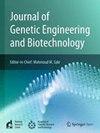Profile of GAS6 gene single nucleotide polymorphisms [GAS6 c.834+7G>A (rs8191974), and GAS6 c.1332C>T (rs1803628)] among a cohort of Egyptian women with preeclampsia: Relation to disease risk and severity
IF 2.8
Q3 Biochemistry, Genetics and Molecular Biology
Journal of Genetic Engineering and Biotechnology
Pub Date : 2025-08-26
DOI:10.1016/j.jgeb.2025.100554
引用次数: 0
Abstract
This study represents the investigation of the potential link between single nucleotide polymorphisms (SNPs) in the growth arrest-specific 6 (GAS6) gene and preeclampsia (PE) in Egyptian women. Few existing research have explored this association in other populations, prompting this investigation into the relationship between variants of GAS6 SNPs and both the probability and severity of PE. 200 pregnant Egyptian women participated in the study; 100 were normotensive, 50 had mild PE, and 50 had severe PE. RFLP-PCR was used to genotype GAS6 SNPs [NM_000820.4:c.834+7G>A (rs8191974) and NM_000820.4:c.1332C>T (rs1803628)] in patients and controls (mean ages 30.33 ± 7.17 and 27.43 ± 5.14 years, respectively). Key findings included a significantly higher frequency of AA genotype (29 % vs. 7 %; P < 0.001) and A allele (56 % vs. 30 %; P < 0.001, OR = 0.337, 95 % CI = 0.223–0.508) of NM_000820.4:c.834+7G>A in PE patients compared to controls. In contrast, the CC genotype (27 % vs. 4 %; P < 0.001) and wild C allele (59.5 % vs. 49.5 %; P = 0.045, OR = 1.499, 95 % CI = 1.009–2.226) of NM_000820.4:c.1332C>T were also significantly more frequent in PE patients. Within PE cases, severe cases showed a higher frequency of the CC genotype of NM_000820.3:c.1332C > T (38 % vs. 16 % in mild cases; P = 0.009) and C allele (68 % vs. 51 %; P = 0.014, OR = 2.042, 95 % CI = 1.149–3.627). These results indicate an association between PE risk and the A allele and AA genotype of NM_000820.4:c.834+7G>A variants. Within this cohort of Egyptian women, PE development and severity were significantly linked to the presence of the CC genotype and C allele of the NM_000820.4:c.1332C>T variants.
GAS6基因单核苷酸多态性[GAS6 c.834+7G>A (rs8191974)和GAS6 c.1332C>T (rs1803628)]在埃及先兆子痫妇女队列中:与疾病风险和严重程度的关系
这项研究调查了埃及女性生长抑制特异性6 (GAS6)基因的单核苷酸多态性(snp)与先兆子痫(PE)之间的潜在联系。现有的研究很少在其他人群中探索这种关联,这促使我们研究GAS6 snp变异与PE的概率和严重程度之间的关系。200名埃及孕妇参与了这项研究;100例血压正常,50例轻度PE, 50例重度PE。采用RFLP-PCR对患者和对照组(平均年龄分别为30.33±7.17岁和27.43±5.14岁)的GAS6 snp [NM_000820.4:c.834+7G>A (rs8191974)和NM_000820.4:c.1332C>T (rs1803628)]进行基因分型。主要发现包括与对照组相比,PE患者中AA基因型(29% vs. 7%; P < 0.001)和a等位基因(56% vs. 30%; P < 0.001, OR = 0.337, 95% CI = 0.223-0.508) NM_000820.4:c.834+7G>; a的频率显著高于对照组。相比之下,NM_000820.4: C . 1332cgt;T的CC基因型(27% vs. 4%; P < 0.001)和野生C等位基因(59.5% vs. 49.5%; P = 0.045, OR = 1.499, 95% CI = 1.009-2.226)在PE患者中也明显更常见。在PE病例中,严重病例中CC基因型NM_000820.3:c的频率更高。1332 C在T(38%比16%在温和的情况下;P = 0.009)和C等位基因(68%比51%,P = 0.014 = 2.042, 95% CI = 1.149 - -3.627)。这些结果表明,NM_000820.4:c.834+7G>;A变异的A等位基因和AA基因型与PE风险存在相关性。在这组埃及女性中,PE的发展和严重程度与NM_000820.4: C . 1332c>;T变异的CC基因型和C等位基因的存在显著相关。
本文章由计算机程序翻译,如有差异,请以英文原文为准。
求助全文
约1分钟内获得全文
求助全文
来源期刊

Journal of Genetic Engineering and Biotechnology
Biochemistry, Genetics and Molecular Biology-Biotechnology
CiteScore
5.70
自引率
5.70%
发文量
159
审稿时长
16 weeks
期刊介绍:
Journal of genetic engineering and biotechnology is devoted to rapid publication of full-length research papers that leads to significant contribution in advancing knowledge in genetic engineering and biotechnology and provide novel perspectives in this research area. JGEB includes all major themes related to genetic engineering and recombinant DNA. The area of interest of JGEB includes but not restricted to: •Plant genetics •Animal genetics •Bacterial enzymes •Agricultural Biotechnology, •Biochemistry, •Biophysics, •Bioinformatics, •Environmental Biotechnology, •Industrial Biotechnology, •Microbial biotechnology, •Medical Biotechnology, •Bioenergy, Biosafety, •Biosecurity, •Bioethics, •GMOS, •Genomic, •Proteomic JGEB accepts
 求助内容:
求助内容: 应助结果提醒方式:
应助结果提醒方式:


